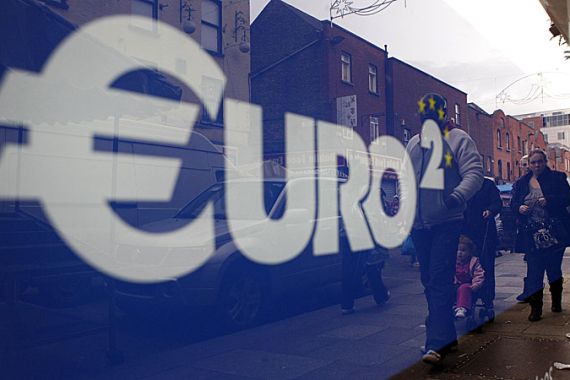China ‘ready to assist’ euro zone
Europe’s largest trading partner offers to help stabilise continent’s debt-ridden economies.

 |
| The single euro currency has been faltering amid fears regarding debt-ridden member countries [GALLO/GETTY] |
China will be willing to assist countries in the euro zone in returning to financial health, and will also support the International Monetary Fund element of a bailout package for the bloc, according to a Chinese foreign ministry spokeswoman.
Making this announcement in Beijing on Thursday, Jiang Yu said that the euro zone is one of China’s most important foreign-exchange investment areas.
Keep reading
list of 4 itemsBiden labels Japan and India ‘xenophobic’ along with China and Russia
KFC Malaysia temporarily closes outlets amid Gaza boycott
Turkey says it halts trade with Israel over Gaza aid access
Her comments followed reports that China could step in to shore up European finances. The EU is China’s largest trading partner, with trade worth $388bn in the first 10 months of this year. Its trade surplus with EU stands at $117.1bn.
In trading on Thursday the euro steadied against the dollar and the Swiss franc, though analysts said the outlook for the currency remained shaky, with fresh losses expected into 2011.
China has the world’s largest foreign exchange reserves, totalling more than $2.6tn, mostly in US dollars.
The country had offered to take more “concerted action” to support European financial stabilisation measures, according to a Financial Times report on Wednesday.
The report cited unnamed senior European officials, who had met Wang Qishan, the Chinese vice-premier.
Separately, a Portuguese newspaper reported that China was prepared to buy up to 5bn euros ($6.6bn) of Portuguese sovereign debt to help the country ward off market pressures. Investors have been concerned that the country would follow Greece and Ireland in seeking a bailout package.
Portuguese officials have said the government is attempting to diversify its debt investor base, with China seen as a priority.
Fernando Teixeira dos Santos, the Portuguese finance minister, met his Chinese counterpart, Xie Xuren, and the head of the People’s Bank of China during a visit to the country last week.
Hu Jintao, the Chinese president, offered “concrete measures” to help Portugal’s weak economy during a visit in November, but stopped short of offering to buy Portuguese bonds.
It remains unclear how far Beijing is willing to go, as authorities face domestic political pressure to invest the country’s foreign reserves more carefully in the wake of the global financial crises. Several Chinese investment funds suffered large losses during the crisis.
Speaking to Al Jazeera, Martin McCauley, a professor on China at University College London, said the Chinese intervention would serve its own economic interests as well, allowing it to achieve technology transfer. This would enable it to manufacture more high-end goods.
The move, therefore, will probably be accompanied by demands from China for the EU to relax heavy restrictions on high-tech goods, as well as the lifting of a 1989 arms embargo.